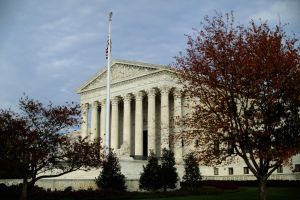Calculus Teacher Ordered to Remove 'God' Banners After Nearly 30 Years
After an initial victory, a high school math teacher lost the battle in keeping his “God” banners displayed in his classroom.
A federal appeals court ruled Tuesday that Bradley Johnson’s First Amendment rights were not violated when he was asked by the school district to take down banners containing words like “God” and “Creator.”
Reversing the earlier decision made by U.S. District Judge Roger Benitez, who allowed the Westview High School teacher to keep his banners up, the U.S. 9th Circuit Court of Appeals ruled in favor of the Poway Unified School District and school principal, and ordered that the signs be removed.
“When Bradley Johnson [the plaintiff]...goes to work and performs the duties he is paid to perform, he speaks not as an individual, but as a public employee, and the school district is free to ‘take legitimate and appropriate steps to ensure that its message is neither garbled nor distorted,’” Circuit Court Judge Richard C. Tallman stated in the suit.
“Just as the Constitution would not protect Johnson were he to decide that he no longer wished to teach math at all, preferring to discuss Shakespeare rather than Newton, it does not permit him to speak as freely at work in his role as a teacher about his views on God, our Nation’s history, or God’s role in our Nation’s history as he might on a sidewalk, in a park, at his dinner table, or in countless other locations.”
The Court concluded that the school district did not violate the San Diego teacher’s rights under either the Establishment or Equal Protection Clauses of the United States Constitution and ordered Johnson to pay all fees, including the school district’s legal expenses.
Although Johnson, who had taught math for more than 30 years in the Poway Unified School District, had displayed his banners in his classroom since 1982, it was only until late 2006 that it became a problem.
That was when a fellow teacher at Westview had questioned the newly hired school principal Dawn Kastner about the banners, who then went to see what the problem was for herself.
What she found in his classroom were two large banners, each about seven feet wide and two feet tall, with one containing phrases like “In God We Trust,” “One Nation Under God,” “God Bless America,” “God Shed His Grace On Thee,” and the other stating, “All men are created equal, they are endowed by their CREATOR.”
Overwhelmed by the size of the banners, Kastner met with Johnson and told him that she felt the signs might inappropriately emphasize the words “God” and “Creator” and also possibly make students of other faiths uncomfortable.
“There were a lot of phrases that individually or in context were not problematic at all,” the principal reported in the lawsuit, with most of the phrases taken out of historical texts like the Declaration of Independence or Pledge of Allegiance. “But because they were taken out of context and very large, they became a promotion of a particular viewpoint...that might make students who didn’t share that viewpoint uncomfortable.”
Although Kastner discussed ways to fix the problem, suggesting displaying the phrases in context or minimizing the banners, Johnson believed that it was his “right to have them up,” and stated that they simply contained patriotic phrases.
The principal then spoke with the school board however, which agreed with the removal of the banners, directing Johnson to review the Poway Unified School District Administrative Procedure, which states that teachers must “distinguish between teaching and advocating, and refrain from using classroom teacher influence to promote partisan or sectarian viewpoints.”
Though Johnson complied with the school district and subsequently removed his banners, he shortly filed a suit in federal court thereafter, claiming violation of his First and Fourteenth Amendments.
Initially, Johnson maintained that his banners were purely patriotic with no religious purposes. But when pressed, he stated, according to the suit, “My purpose was to celebrate our national heritage... I’m trying to highlight the religious heritage and nature of our nation, that we have that as a foundation.”
“No one in their right minds would think that to read segments or excerpts from the great founding documents of this country which include invocations of the Almighty, that that could conceivably violate some students’ religious rights,” Peter Scheer, the executive director of the California First Amendment Coalition told the North County Times.
Johnson, in charge of the Christian club at the school, believed he was being discriminated against because the banners contained phrases involving Christianity, whereas other teachers at all four high schools in the district were allowed to display what he thought were sectarian viewpoints, including Tibetan prayer flags, a Dalai Lama poster, and a Mahatma Gandhi poster as well.
Benitez, the original judge overseeing the case agreed with Johnson. “May a school district censor a high school teacher’s expression because it refers to Judeo-Christian views, while allowing other teachers to express views on a number of controversial subjects, including religion and anti-religion? On undisputed evidence, this court holds that it may not.”
But the Circuit Court of Appeal, although understanding the district court’s mistake, found otherwise. “In evaluating the constitutionality of the other displays, we think the court neglected its own admonishment that government speech ‘simply having religious content or promoting a message consistent with a religious doctrine does not run afoul of the Establishment clause.’”
“Admittedly, Gandhi, the Dalai Lama...each [has] some religious connotation. However, as the district court noted, simple connotation does not run afoul... Each would be violated only if used to endorse or inhibit religion, and nothing in the record suggests such use here.”
Johnson told KGTV San Diego that he will appeal the new ruling and is willing to take his case all the way to the Supreme Court, no matter what the cost.
“I think I’d take a second mortgage, sell my house, I would do it,” he concluded.





























